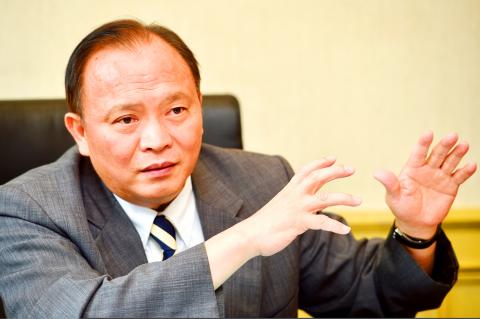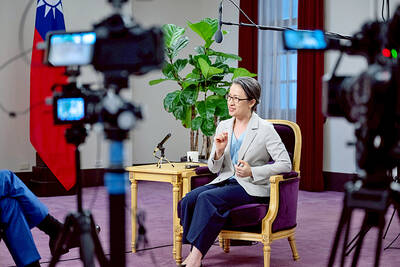Liberty Times (LT): How does the council view the series of food security incidents including the avian flu outbreak, pesticide abuse and excessive dioxin in eggs? How does it plan to improve the situation?
Lin Tsung-hsien (林聰賢): There are rumors that the council is about to relax regulations on more than 100 kinds of pesticides; this is a severe misunderstanding. The pesticides are not additional ones, but rather an expanded list of allowed pesticides.
The nation’s limited agricultural space has caused different kinds of crops to be planted in close proximity to each other. In such circumstances, pesticides originally intended for rice might be carried over to nearby vegetable patches or fruit orchards. While the pesticides will not necessarily be harmful to humans, it would prevent farmers from being able to sell their products, leading to losses.

Photo: Peter Lo, Taipei Times
To address this issue, former council minister Chen Bao-ji (陳保基) issued a directive to look into amendments that would allow for residues of legal pesticides on other agricultural products.
This is a continuing policy that is not affected by party affiliation, and the prime goal is to protect the rights and benefits of farmers. It will not affect food security.
Regarding excessive dioxin in eggs, preliminary findings are not excluding that farmers have added dirt to the feed of their own volition. The council will soon have results on the source of the contamination.
Regardless if this is an isolated incident, there is limited land and fields are often side-by-side with industrial zones and even residential areas. Therefore, agricultural products are threatened with pollution by industrial waste or materials.
The council must admit that responsibility for agricultural products and pollution control cannot be divided clearly among governmental agencies. Instead, a joint effort between the council, the Ministry of Health and Welfare and the Environmental Protection Administration should seek to prevent illegal materials from entering the production chain of agricultural foodstuffs.
The council is seeking to establish a “production resume” for agricultural products that would provide more in-depth information while stepping up the responsibility of product control for production, logistics and sales.
Certificates such as the Certified Agricultural Standard and the Good Agricultural Practice certificate will be integrated into a nationwide Taiwan Good Agricultural Practice certificate as early as 2020.
The new certificate will provide checkpoints for all processes, including environment, use of pesticides, packaging and delivery, and rebuild consumers’ faith in agricultural products.
LT: Pollution is as numerous as there are sources, and it seems the government is always playing catch-up. Is there a method to address pollution at its root?
Lin: We hope to tackle the issue at its source by reducing pesticide usage, or in some cases by not using pesticide at all. We also hope to promote the concept of biological prevention, such as dealing with agricultural pests like channeled applesnail by introducing predators, such as ducks or fish. Such methods would help drive off pests while ensuring less environmental pollution.
The council is also hoping to introduce a “plant doctor” act that would give doctors the task of supervising the purchase and usage of pesticides by handing out “prescriptions,” thereby addressing the issue of farmers’ being able to buy and use pesticides of their own volition.
The council is also looking to increase the consumption of agricultural products by mandating the use of “excellent materials” in military messes and student lunches.
In addition, the council is looking to introduce an act promoting organic farming, as well as an act encouraging education about the relations between food and agriculture to ensure the elevation of product quality due to increased consumption.
LT: Is impractical use of farmland — such as the illegal occupation of fields by factories and the excessive building of farmhouses — the biggest challenge to the government’s proposed “new agricultural paradigm”?
Lin: The nation needs to promote a new agricultural industry that emphasizes quality and food safety.
The council’s first step is to take stock of farmland nationwide, which it expects to complete by the end of next month. It will determine whether there actually is 750,000 to 810,000 hectares of arable farmland for growing grains [as estimated] and integrate all of that land into a “designated production zone.” Of that total, 270,000 hectares will be improved and opened to the public for diversified farming.
To take a 2,850-hectare farmland improvement project in Tainan as an example, 287 hectares has sat idle for the short or long term and about 1,300 hectares is owned by uninsured farmers.
On a national scale, there is a large amount of land that is either sitting idle or not being used for what it was intended.
What is more important is raising farmers’ incomes, improving agricultural insurance coverage and improving access to subsidies for farming implements like netting. In this way, farmers’ profits can be improved. Our goal is to raise farmers’ household annual income from NT$1.3 million to NT$1.8 million (US$43,072 to US$59,638). That way, we can tackle the problem of skilled people leaving farming communities.
There are about 1,000 people nationwide who farm on a part-time basis. We hope to attract up to 40,000 people into the industry.
LT: How will the agricultural industry respond to US pork and other foreign agricultural products entering Taiwan?
Lin: Only if the industry and farmers are competitive will there be the capital to deal with challenges from foreign products. International trade means exporting, but it also means importing.
Therefore, the decision by the former president Ma Ying-jeou’s (馬英九) administration to import US beef containing the leanness-enhancing drug ractopamine means that importing beef is an unavoidable part of trade. Whether it poses a health risk will have to be left to the Ministry of Health and Welfare to evaluate.
If the council wants to improve the competitiveness of [domestic] pork, it should avoid the use of ractopamine. Taiwanese love domestic pork, so there should be no need to fear the import of US pork.
Foreign producers of soybean, millet and corn also want to enter the market. If plans for a large reserve granary are to be realized, farmers in the south should be encouraged to switch from rice cultivation to growing grains that consume less water. The nation’s self-sufficiency could be increased from 36 percent to 40 percent within three years, making it easier for Taiwanese to buy domestic grain products.
The nation must also take on the international market. The edamame bean market has already been targeted, of which Japan accounts for nearly 50 percent. The nation aims to also take on the banana, sugar apple, pineapple and mango markets, as well as markets for high-priced flowers such as the Oncidium flexuosum and the moth orchid, but the industry needs to modernize to deal with supply and quality problems so transactions can be customized and high-value markets can be tackled.
Translated by Jake Chung and William Hetherington

China might accelerate its strategic actions toward Taiwan, the South China Sea and across the first island chain, after the US officially entered a military conflict with Iran, as Beijing would perceive Washington as incapable of fighting a two-front war, a military expert said yesterday. The US’ ongoing conflict with Iran is not merely an act of retaliation or a “delaying tactic,” but a strategic military campaign aimed at dismantling Tehran’s nuclear capabilities and reshaping the regional order in the Middle East, said National Defense University distinguished adjunct lecturer Holmes Liao (廖宏祥), former McDonnell Douglas Aerospace representative in Taiwan. If

TO BE APPEALED: The environment ministry said coal reduction goals had to be reached within two months, which was against the principle of legitimate expectation The Taipei High Administrative Court on Thursday ruled in favor of the Taichung Environmental Protection Bureau in its administrative litigation against the Ministry of Environment for the rescission of a NT$18 million fine (US$609,570) imposed by the bureau on the Taichung Power Plant in 2019 for alleged excess coal power generation. The bureau in November 2019 revised what it said was a “slip of the pen” in the text of the operating permit granted to the plant — which is run by Taiwan Power Co (Taipower) — in October 2017. The permit originally read: “reduce coal use by 40 percent from Jan.

‘SPEY’ REACTION: Beijing said its Eastern Theater Command ‘organized troops to monitor and guard the entire process’ of a Taiwan Strait transit China sent 74 warplanes toward Taiwan between late Thursday and early yesterday, 61 of which crossed the median line in the Taiwan Strait. It was not clear why so many planes were scrambled, said the Ministry of National Defense, which tabulated the flights. The aircraft were sent in two separate tranches, the ministry said. The Ministry of Foreign Affairs on Thursday “confirmed and welcomed” a transit by the British Royal Navy’s HMS Spey, a River-class offshore patrol vessel, through the Taiwan Strait a day earlier. The ship’s transit “once again [reaffirmed the Strait’s] status as international waters,” the foreign ministry said. “Such transits by

Taiwan is doing everything it can to prevent a military conflict with China, including building up asymmetric defense capabilities and fortifying public resilience, Vice President Hsiao Bi-khim (蕭美琴) said in a recent interview. “Everything we are doing is to prevent a conflict from happening, whether it is 2027 or before that or beyond that,” Hsiao told American podcaster Shawn Ryan of the Shawn Ryan Show. She was referring to a timeline cited by several US military and intelligence officials, who said Chinese President Xi Jinping (習近平) had instructed the Chinese People’s Liberation Army to be ready to take military action against Taiwan